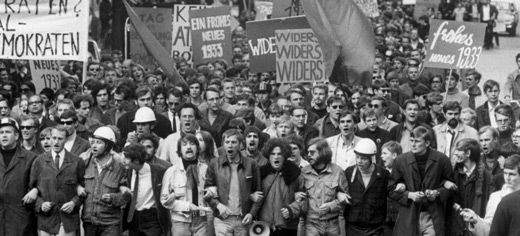
As the world prepares to mark 70 years since the liberation of Auschwitz, an international exhibition looking at how Germany confronted the Holocaust is unveiled.
Led by academics from the University of Leeds, Germany’s Confrontation with the Holocaust in a Global Context is part of a series of activities examining post-war responses of Germans to the crimes committed in their name: responses of silence, outrage, reconciliation and memorialisation.
The exhibition opens at Leeds Town Hall on Monday 19 January. An international unveiling will coincide with Holocaust Memorial Day on Tuesday 27 January – 70 years since the Red Army liberated the camp, where more than a million people were killed.
On that date, the exhibition will go on show to the public at the University of Leeds, the National Holocaust Centre near Newark, Nottinghamshire, and Cape Town Holocaust Centre in South Africa.
Professor Stuart Taberner, from the School of Languages, Cultures and Societies at Leeds, is leading the international project, which is the culmination of a year-long public engagement programme funded by the Arts and Humanities Research Council.
He said: “The exhibition looks at the way Germans have tried, often with admirable honesty but sometimes less openly, to face up to the Holocaust and the way other countries deal with their own difficult pasts – and difficult presents.
“For North Americans and Europeans, these include slavery and colonialism, such as Britain’s less than glorious legacy of decolonialisation in Kenya or rule in Ireland. In South Africa, there is apartheid, and before that the long history of inter-communal conflict and oppression.
“However loudly we recite the lesson of the Holocaust – ‘never again!’ – we seem unable to prevent new mass killings in Kosovo, Rwanda, Darfur, or, right now, Iraq and Syria. Intolerance of others underlies these atrocities, just as it drives radical Islamists to gun down cartoonists in Paris.
“The exhibition is intended as a tribute to the victims, and as an act of memorialisation. In showing how the Holocaust has been remembered in Germany, the perpetrator nation, however, we hope also to focus attention on the hatred that is still all too common today.”
In addition to the exhibition, Falling to our Knees, a short play devised by Theatre Company Blah Blah Blah and Escape Contemporary Youth Theatre, two Leeds theatre companies that work with and for children and young people, will also be performed in the city, while a leading member of South Africa’s Truth and Reconciliation Commission is among panellists for a public lecture and discussion at the University.
Pumla Gobodo-Madikizela will be joined by fellow author Eva Hoffman and academics Marianne Hirsch and Leo Spitzer at the 26 January event, which is part of an international conference on Holocaust memory at the University of Leeds.
Transnational Holocaust Memory will explore how the memory of the Holocaust is being shaped by forces such as mass migration, global travel and tourism, economic globalization, digital media and the internet.
Dr Adam Strickson, Teaching Fellow in Creative Writing at the University, will deliver the keynote speech at Leeds Town Hall at 2pm on Sunday [25 January] at a civic remembrance event. Dr Strickson has worked with refugees, asylum seekers and holocaust survivors for 15 years and is a founding trustee of 6 Million +, which aims to create a permanent public sculpture in Huddersfield commemorating those who died in the Holocaust and continuing genocides.
The Lord Mayor of Leeds, Councillor David Congreve said: “As part of the city’s commemoration of Holocaust Memorial Day, the University of Leeds has put together a diverse range of events this year, which will provide people with the opportunity to reflect, remember and discuss different aspects of this truly terrible event.”
The exhibition will eventually also be displayed in Nottingham, Coventry, Aberystwyth, Chester, Birmingham, Newcastle, and Durham, and, internationally, in Cork, Copenhagen and the University of Notre Dame in Indiana, USA.
Other key partners in the project include the Holocaust Survivors Friendship Association, the University of the Free State, Leeds City Council and Nottingham Trent University.
Further information
For images and interviews, contact University of Leeds press officer Gareth Dant on 0113 343 3996 or g.j.dant@leeds.ac.uk.
The project is on Twitter @transholomemory